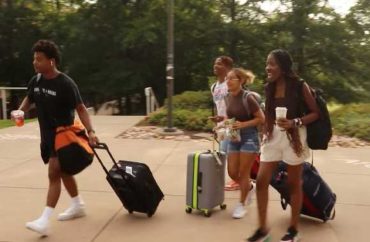
UPDATED
Students should master basic skills before they take on college life
A growing number of college students rely on administrators to spare them some of the challenges of living on their own. But students are adults, and they should learn lessons in basic self-management and virtue before they take on the freedom and responsibility of a demanding and often costly college education.
Approximately one-third of first-time freshmen don’t return for their sophomore year, many for financial reasons, according to U.S. News & World Report.
However, “many others leave because the support services they and their parents feel they have been promised are often impossible for colleges and universities to provide,” Lee Burdette Williams, former dean of students at Wheaton College and the University of Connecticut and a higher education consultant, wrote August 31 in Common Sense.
“I have spent my career working with college students from enrollment through commencement,” Williams wrote. “As a dean of students—at the University of Connecticut, and later at Wheaton College—I talked with numerous parents who were startled to discover that their child had not been attending class, had not been turning in assignments, maybe hadn’t bathed in days.”
“The parents had expected more supervision; we had expected more personal accountability,” she wrote. “Caught in that gap was a student about to lose a semester of academic credit and thousands of dollars of wasted tuition and housing fees, often covered by loans that still had to be paid back.”
Students unprepared for college will fail or turn to adults who are not equipped
When a student is not prepared for the independent living and rigorous academic work required by a solid college program, one of two things can happen. The student can fall behind, or other adults can try to fill the gap.
Parents try to help, but they are often physically far away and have competing responsibilities. Doctors and other professionals have scheduling limitations, and friends may be similarly overwhelmed. That leaves campus administrators and other support staff.
There were more than 5,000 administrators at Yale University in 2021 — at a cost of $2.7 billion, a five percent price increase from 2020, according to the Yale Daily News.
“What concerns my colleagues and me is the growing expectation among parents and students that college administrators are there not to guide young people, whatever their challenges, in mastering the tasks of adulthood, but to spare young people from them,” Williams wrote.
Hence, witness the growth of student services designed to help usher young people into adulthood.
Williams recommends that students have mastered basic skills before they graduate to adult living
Rather than rely on an expensive and often under-equipped administrative army to solve their problems – which may not make students stronger or more independent, and certainly makes college more costly – students should come to college prepared with some adult skills, Williams argued.
It sounds basic, but Williams stated that families need to teach their prospective freshmen “activities of daily living.” This means that students, at minimum, need to be able to complete their own chores, care for their own health and hygiene, complete work in a reliable manner, and get up on time in the morning.
“If a student can’t hold down a summer job, or prefers simply not to try, that student is not ready for the hard grind of college classes,” Williams wrote.
Williams also argued that students with severe, unmanaged mental health issues should strongly consider achieving stability before they take off for the dorms.
“Too often, parents’ expectations about the mental health and support services that will be available at college bear no relation to reality,” and “counseling centers are understaffed,” Williams wrote.
Mental illness needn’t keep someone away from college, but “serious diagnoses require serious support,” and sometimes that needs to happen off-campus, according to Williams.
Lastly, parents and students alike need to remember that college is “not kindergarten,” Williams said. In her career, she heard from many instructors whose students’ parents asked that they not criticize their children’s work or offer them extra time for assignments, she wrote.
“If students are so fragile that they can’t deal with criticism, or if they can’t meet deadlines, it may be time to reconsider college,” Williams stated.
Sometimes college can and should be postponed, or even reconsidered
Many students who have not yet mastered these skills might benefit from a half or full gap year before college that would allow them to live at home while working or attending college part-time, Williams wrote. There they could “learn the self-advocacy and self-care necessary to survive in college, practicing them with a parental safety net in place before taking the full step onto a campus and into a residence hall,” according to Williams.
“Spending a year at a job (where an employer doesn’t have the time or obligation to address personal issues), or volunteering, or traveling independently can result in game-changing gains in maturity and personal accountability,” Williams continued.
Additionally, college programs that combine hands-on training, nonacademic work or trade school with academic study, like the planned College of St. Joseph in Ohio, might jump-start college kids’ maturity while sparing their families the cost of wasted time or meaningless courses.
Many students are unready for college, and adults should offer compassion while insisting on preparedness
We should have compassion for the students who come to college underprepared to live as adult scholars. Each of us probably knows such a student, or even was one.
College is a learning experience for everyone, and no one arrives on campus with all their adulting skills perfectly developed. Some will have crises they couldn’t have predicted, and everyone needs help from time to time. Some student service professionals are certainly necessary.
But that doesn’t mean we should automatically send fragile and unskilled teenagers into a university free-for-all at great expense because it’s the middle class or expected thing to do.
College offers many opportunities to get in trouble, and a lot of time and tuition dollars to waste. Young people should do what they need to do to grow up before they fly out of the nest.
MORE: Inflated diversity bureaucracy conquers — and divides — the University of Michigan
IMAGE: WUVA News/YouTube
Like The College Fix on Facebook / Follow us on Twitter






Please join the conversation about our stories on Facebook, Twitter, Instagram, Reddit, MeWe, Rumble, Gab, Minds and Gettr.